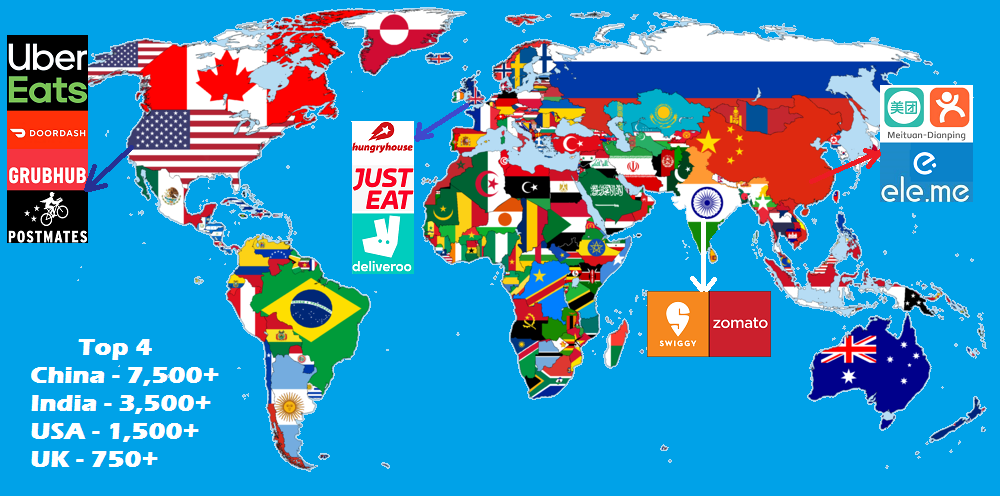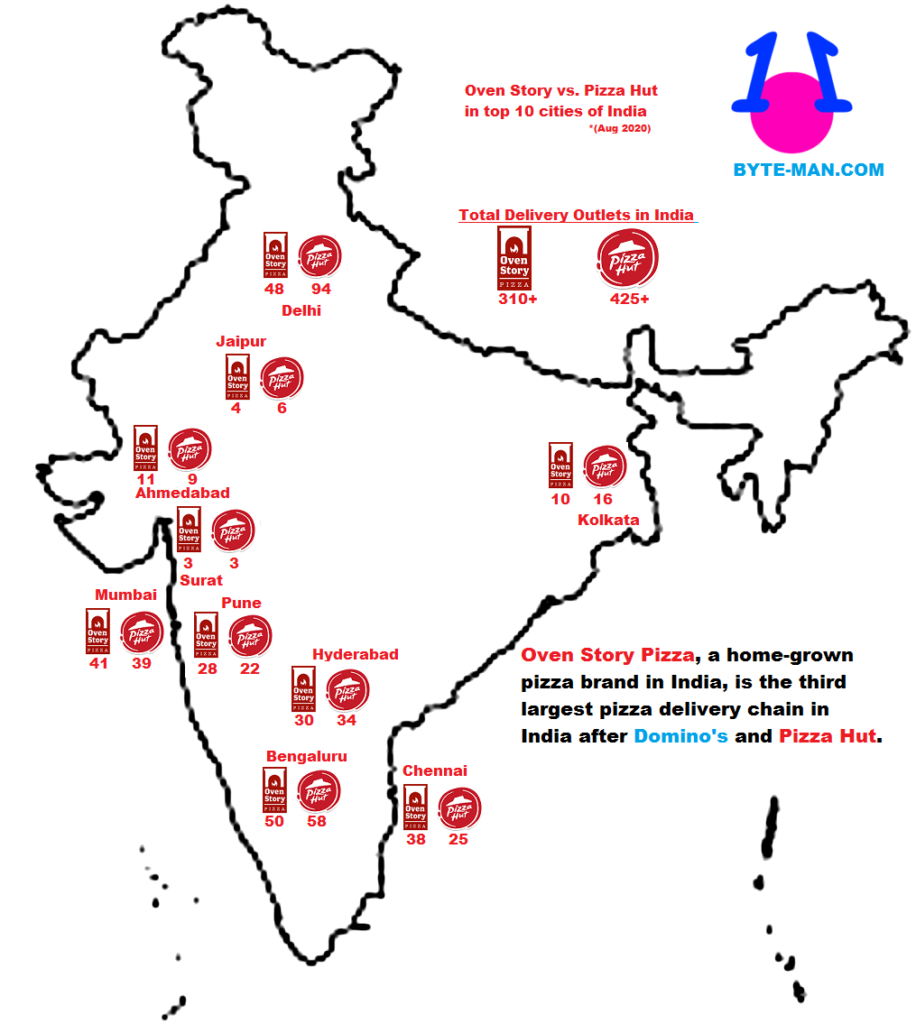During COVID‑19 pandemic, virtual restaurants are better suited to the needs of socially distanced customers than traditional dine-in restaurants. They are also able to minimize running costs, such as rent and fewer staff. Virtual restaurants are projected to become a $2 billion industry in India by 2024, according to RedSeer Management Consulting. That’s up from $400 million in 2019.
Ancestors of Virtual Restaurants
The concept of takeaway or delivery only, without dining, has been around for over half a century globally. While pizza and burger delivery points were prevalent in the West, in India we have the long standing tradition of tiffin/dabba/thali services or vadapav/samosa etc fast foods; these are ancestors of current cloud kitchens and have been around for the decades. In these systems, only internet and web/app technology were missing.
Terminology of the Virtual Restaurant
A virtual restaurant is primarily a restaurant kitchen that accepts incoming orders only through online ordering systems and usually offers no dine-in facility.
The following steps shall help understanding the whole idea of virtual restaurant;
1.) Orders are received from the customers via food aggregators, online ordering portals, own mobile app or website etc
2.) Kitchen in-charge note down the order details
3.) Food is prepared as per the instructions and order
4.) Effective and accurate packing is done of the prepared food
5.) Finally, the delivery boy from the restaurant or a third-party service, delivers the packed food parcel to the customer
Virtual restaurants are also known as:
- Dark Kitchens
- Ghost Kitchens
- Cloud Kitchens
- Satellite Kitchens
- Invisible Kitchens
- Shared Kitchens
- Headless Restaurants
Types of Virtual Restaurant
1.) Traditional cloud kitchen: Single brand, single kitchen, no storefront. Example: Biryani by Kilo
2.) Multi-brand cloud kitchen: Multi-brand(cuisine), single kitchen, multiple outlets, no storefront. Notable Example: Rebel foods.
3.) Takeaway cloud kitchen: Single brand, single kitchen, multiple outlets, with a storefront. Notable Example: Freshmenu.
4.) Aggregator-owned cloud kitchen: Aggregator owned, multi(restaurant) brand, rented co-working kitchens, no storefront. Notable Example: ‘Swiggy’
5.) Aggregator-owned cloud kitchen ‘plus’: Aggregator owned, multi(restaurant) brand, rented kitchens, with a storefront. Notable Example: ‘Zomato’
6.) Fully Outsourced cloud kitchen: Cooking and delivery fully outsourced. Notable Example: ‘Kitopi’.
7.) Shared kitchen-space cloud kitchen: Large kitchen infrastructure is well-divided amomg multiple restaurants’ brands. Notable Example: ‘FoodCoWorks’
The Pros And Cons of Cloud Kitchens
The Pros of Cloud Kitchens
- Quick To launch
- Lower start-up costs and risks
- Lesser rental prices
- Lesser Staff Requirement
- Lower operation costs
- Data-Driven Menus
- Better expansion opportunities
The Cons of Cloud Kitchens
- Dependency on internet/technology
- Dependency on delivery platforms
- Competition with food aggregators
- Online visibility only
- Online customers only
- No in-person customer interaction
- Online reputation and reviews
Market of Virtual Restaurant
Top 4 Ghost Kitchen/Cloud Kitchen Hubs In The World

India currently has 3,500+ ghost kitchens, putting it behind Chinese market (7,500+) but ahead of the U.S. (1,500+) and the U.K. (750+), according to Euromonitor data. Euromonitor also estimates that ghost kitchens could create a $1 trillion global opportunity by 2030.
Food Aggregators
Online-platforms such as Zomato, Swiggy and Uber Eats are food aggregators. Early they were mediators between customers and local restaurants and were the medium to receive customer orders and to provide customer support. However in the past few years, food aggregators have aggressively promoted the inclusion of cloud kitchens on their platform.
Cloud Kitchens in India
Top Cloud Kitchen Brands In India
- Faasos
- Behrouz Biryani
- Oven Story
- Sweet Truth
- Firangi Bake
- MOJO Pizza
- BOX8
- FreshMenu
- Biryani by Kilo
- Khichdi Experiment
Rebel Foods is the largest cloud kitchen restaurant company, with over 3000+ restaurants serving across 30+ cities via online food delivery. Rebel Foods is a less than a decade old startup, commonly known for its larger brands – Faasos, Behrouz Biryani, Oven story Pizza, Sweet Truth, Firangi Bake and Mandarin Oak etc.
Poncho Hospitality Private Limited, founded in 2012, doing business as Box8, owns and operates an on-demand food delivery company. Its known brands are BOX8, MOJO Pizza and Mealful Wraps.
Freshmenu, founded in 2014, is an online food delivery platform that allows users to discover and order packaged meals.
Ola Foods has also launched three new brands — Bowlsome, Paratha Experiment, and Meal Kits, and expanded its selection under top-selling brand Khichdi Experiment. In October 2019, Ola started to scale up private brands, starting with Khichdi Experiment, after shutting down its food delivery marketplace Foodpanda.
Gurgaon-based Sky Gate Hospitality Pvt. Ltd, founded in 2015, runs Biryani by Kilo (BBK), a premium biryani brand chain. The company primarily operates under the cloud-kitchen model with a few dine-in restaurants at select locations.
Homefoodi, incepted in October 2019, is a mobile application for home-made food by home chefs. Cheferd Foods is another cloud kitchen company of brands like POMP- Pizza On My Plate, BIMBo- Burger In My Box and DSC- Deli Salad Company. Hoi Foods, founded in 2017, supplies food to budget hotels and also serves consumers of online food ordering platforms Swiggy and Zomato, through cloud kitchens created in these budget hotels itself.
In fact, Oven Story Pizza, a home-grown pizza brand in India, is the third largest pizza delivery chain in India after Domino’s and Pizza Hut. At present, Oven Story Pizza has 310+ take away centres across India.




